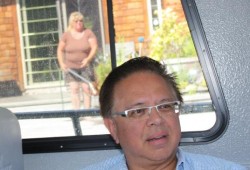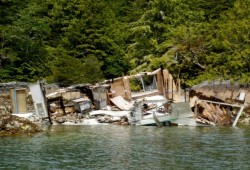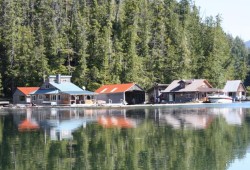The “explosion” of illegal float homes populating the Barkley Sound will be revisited at a meeting next week, Tseshaht Chief Councillor Hugh Braker told Ha-Shilth-Sa. It will be the second meeting that Tseshaht will attend on the subject since returning from the Christmas break.
There are 100 float homes in Barkley Sound, all unregulated, Braker explained. People are putting them up wherever they want. The first nation toured the area last year and witnessed raw sewage being dumped into the Sound, float home owners constructing things on the shores adjacent to their buildings and huge areas of water around the homes boomed off.
“There were a lot of things that annoyed us,” Braker said.
Of particular concern to Tseshaht is Julia Passage where there is a “subdivision of homes” now in the area, said Braker. Julia Passage is a sheltered place between Vancouver Island and the Alma Russell Islands. These islands are a place of historical and cultural significance to the Tseshaht. There are now more than 30 float homes in the passage, Braker estimates.
There are things in the area (which Braker would not disclose) that are hundreds, if not thousands of years old, kept hidden from everyone, said Braker. Famous battles in Tseshaht history were fought there. It used to be an area where Tseshaht historically collected shellfish.
Last year the whole area was closed off to the shellfish harvest. Braker said some of that could have been naturally occurring because the flow of the water there is restricted, “but there is no doubt in my mind that is the raw sewage,” Braker said about the closure.
Barkley Sound is Tseshaht’s kitchen, “our garden… we harvest seafood from there.” He also pointed out that the salmon that return to Port Alberni all go through those waters.
There are many stakeholders with interest in the issue. The last discussion saw representatives from Tseshaht and Uchucklesaht first nations, the Alberni Clayoquot Regional District, the City of Port Alberni and the Port Authority sit down with the province to express their concerns. Russell Dyson of the regional district said groups are urging the provincial government to take the lead on the problem.
“It’s quite a mishmash of groups and people,” said Braker. Asked if the dialogue is moving this mishmash closer to a resolution, Braker said “discussions are ongoing,” adding he doesn’t expect anything major to be decided any time soon given there is a provincial election on the horizon in May.
“In our view the entire problem has been caused by the province,” said Braker. “They did nothing since the first float homes went in in the 1960s. From the 1960s to the 1990s, the number of float homes grew at best by maybe one or two a year—at best; some years none. Then all of a sudden in the ‘90s there was an explosion of float homes in the Barkley Sound area.”
The province issues a fine of about $1,000 each year to the float home owners. Braker said the penalty isn’t doing anything to slow residential development on the water.
“That’s nothing,” said Braker, who compared that to what someone would have to pay to rent a home per month in Port Alberni.
Braker said next week’s discussion may focus on measures the provincial government can take in the interim until a resolution to float homes can be decided. Increased penalties or fees levied against the homes, float home inspections, and the removal of some of the homes altogether are all suggestions being put on the table. There is also a study that Tseshaht would like see done that would identify key areas of cultural significance in the area.
The float home concern is not a Barkley Sound issue alone, said Braker.
“It’s a problem in Clayoquot Sound. It’s a problem in Friendly Cove, in the Mowachaht/Muchalaht area. It’s growing up and down the coast,” he said.
Even inland there have been issues. Hupacasath Nation is turning the float home issue on Great Central Lake to its advantage. Through the agreement with the province to accommodate Hupacasath for lands taken out of Tree Farm License 44, the nation now has the authority to develop two float home marine parks on the lake.
Hupacasath is currently in the feasibility stage of the project and estimates that within the next two months they’ll be at the business plan stage, said CEO Robert Duncan. The nation will force the relocation of the current float homes (42 in all) to their parks and away from sensitive spawning areas, or they will be removed from the lake altogether.
The nation will standardize the building materials that can be used to construct the homes. Hupacasath will build a sewage treatment facility, and later will custom build homes and have rentals available. Hupacasath has turned their problem into a potential revenue stream, and Duncan said they’d like to get moving on the project sooner, rather than later.










